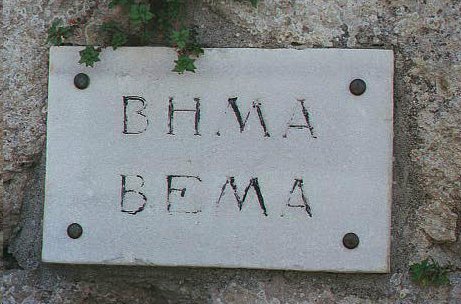

(St. Paul's Rock 2004)
Saint Paul,
also called Saul in Hebrew (Acts 7-13), was a leader of the early Christian
movement and was instrumental in its spread througho ut
the Greco-Roman world. He was born in Tarsus of Cilicia in Anatolia probably
between AD 1 and 10. Thirteen New Testament letters have been attributed to him,
many of which show him adjusting Jewish ideas and traditions to new
circumstances and measuring Old Testament laws by their relevance to Jesus
Christ. The Book of Acts presents him as the apostle to the Gentiles and the
most prominent early Christian leader next to Saint Peter.
ut
the Greco-Roman world. He was born in Tarsus of Cilicia in Anatolia probably
between AD 1 and 10. Thirteen New Testament letters have been attributed to him,
many of which show him adjusting Jewish ideas and traditions to new
circumstances and measuring Old Testament laws by their relevance to Jesus
Christ. The Book of Acts presents him as the apostle to the Gentiles and the
most prominent early Christian leader next to Saint Peter.
Paul was born a Jew and trained to be a Pharisee, that is, a learned and strict observer of religious law. The New Testament records how he actively tried to suppress the early Christian movement through persecution (Gal. 1:13-14) until he was converted to Christianity by a visionary encounter with the risen Jesus while on the road to Damascus about AD 36 (Gal. 1:15-16; Acts 9:1-31; 22; 26). Because of this vision, Paul held that he, too, had met Jesus and was therefore qualified to be called an Apostle (1 Cor. 9:1). After being instructed and receiving Christian baptism in Damascus, Paul went to "Arabia" (probably the desert of Tran Jordan) for a short time; he then returned to Damascus for 3 years until he was driven out to Tarsus, probably in 40. Several years later Barnabas brought Paul to Antioch in Syria (Acts 11), where they ministered together for a year.
Paul spent the following 10 years on 3 lengthy missionary journeys to Anatolia and Greece. The second journey included an 18-month stay in Corinth and the third, 2-3 years in Ephesus on the Aegean Sea. During this time Paul wrote letters to churches he had previously founded and could not visit in person. Some of these letters have been preserved in the New Testament. Paul was especially concerned that he protect his understanding of the life and teachings of Jesus from alteration toward Jewish practices or toward Hellenistic religious and philosophical ideas. He instructed the Christian communities he founded in ethical behavior by correcting their failings and offering advice. The Book of Acts describes the typical pattern of Paul's ministry: he began by preaching in a synagogue but was soon expelled as a rabble-rouser; then, with a small number of Jewish adherents, Paul turned to the Gentiles, converting large numbers and occasionally encountering trouble with civil authorities.
The different accounts of Paul's visit to Jerusalem to settle the controversy over how much of the Jewish Law Gentile Christians were required to keep (Gal. 2; Acts 15) have never been fully reconciled. Year’s later (c.58), Paul brought a collection to Jerusalem for the city's poor Christians (Acts 21), but he was arrested. After 2 years in prison he used his right as a Roman citizen to appeal to the emperor and was sent to Rome for trial. The Book of Acts ends with Paul under house arrest (c.63), still preaching about Jesus. Clement of Rome and Eusebius of Caesarea report that Paul was eventually acquitted and traveled to Spain but was arrested again and martyred in Rome under Nero, c.67. Feast day: June 29 (with Saint Peter).
Holy Land Greece Pilgrimages Pilgrimages Map Index Español English Index